Key takeaways:
- Mentorship in finance fosters confidence and critical thinking, helping mentees navigate complex financial decisions.
- Crypto education is essential for young learners, encouraging financial literacy, innovation, and critical thinking about technology.
- Engaging with mentors can significantly shape a child’s understanding of finance and empower them to envision their futures.
- Finding the right mentor often involves reaching out to local networks and expressing genuine interest in learning.
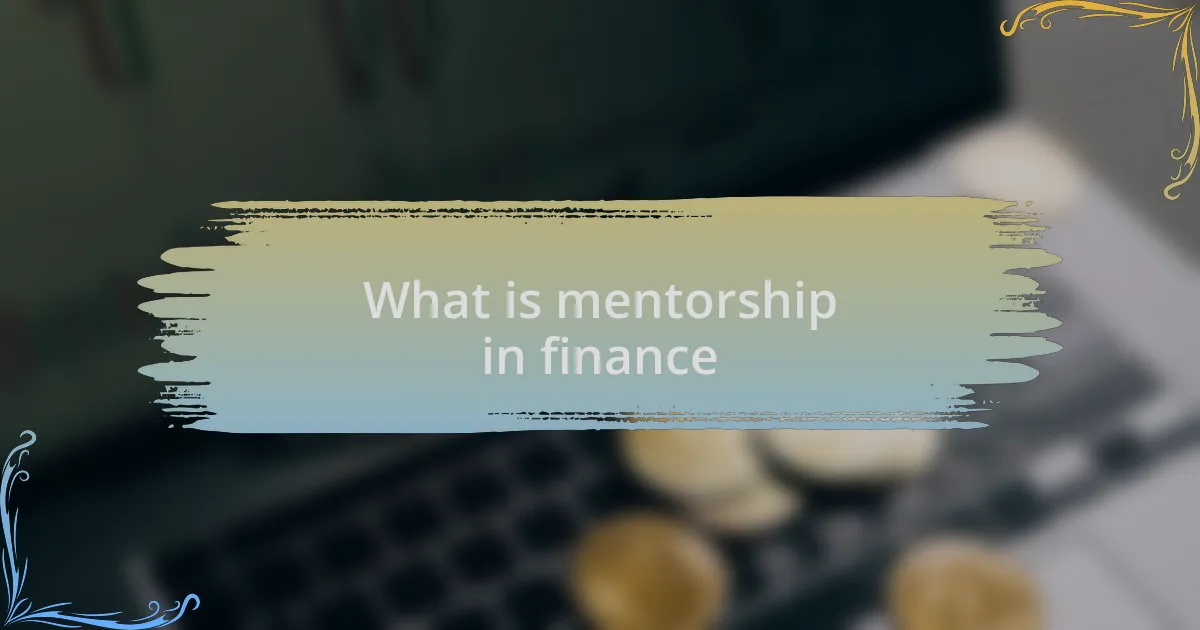
What is mentorship in finance
Mentorship in finance is a relationship where a more experienced individual guides someone less experienced in financial concepts and decision-making. This relationship can be incredibly transformative, as mentors share their insights and experiences, enabling mentees to build a solid foundation in finance. I remember my first meeting with my mentor—his enthusiasm was contagious, and his passion for teaching inspired me to learn more than I ever thought possible.
In finance, mentorship isn’t just about sharing knowledge; it’s about fostering confidence and resilience. I often think back to moments when my mentor encouraged me to tackle complex financial problems. Those were times when I felt vulnerable, yet with his guidance, I learned to turn challenges into opportunities. Have you ever struggled with a financial decision and wished someone with experience could help navigate the options? That’s the power of having a mentor—someone who not only advises but also believes in your potential.
The best mentorship experiences often involve an ongoing dialogue, where both parties learn from each other. I found that my mentor would ask me probing questions, pushing me to think critically and develop my own financial strategies. This dynamic not only enriched my understanding but also created a bond grounded in mutual respect and growth. Isn’t it amazing how a simple conversation can lead to profound insights?
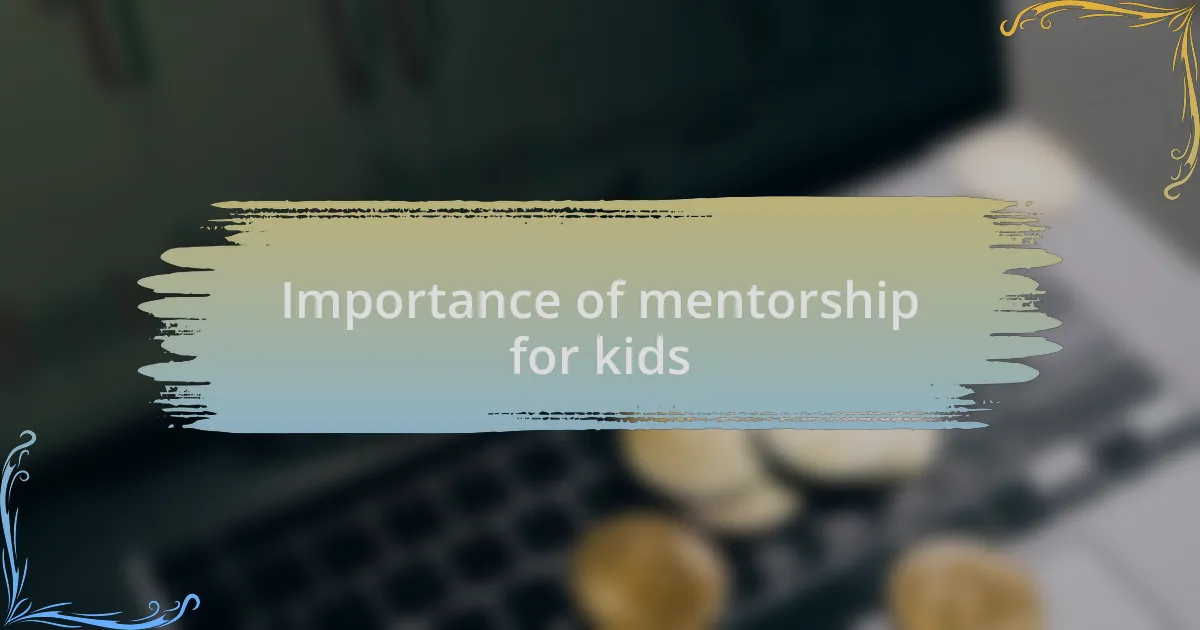
Importance of mentorship for kids
Having a mentor can significantly shape a child’s understanding of finance. I recall one instance when I was hesitant about a major investment choice; my mentor urged me to analyze the risks and potential rewards. This wasn’t just advice—it was a lesson in critical thinking that helped me see financial decisions in a new light. Can you imagine how much more empowered kids would feel if they had someone to help them navigate tough choices?
One of the most powerful aspects of mentorship is the encouragement it provides. When I faced setbacks, my mentor always reminded me that failure is a stepping stone to success. This perspective was invaluable, especially in a field like finance where mistakes can feel daunting. How liberating would it be for children to know that challenges are just part of the journey rather than indicators of their worth?
In addition to imparting knowledge, mentors nurture essential life skills such as communication and problem-solving. I vividly remember how my conversations with my mentor helped me articulate my thoughts more clearly and confidently. It made me wonder: What if every child had access to someone who could help them practice and refine these skills? The impact could be profound, paving the way for future leaders in finance and beyond.
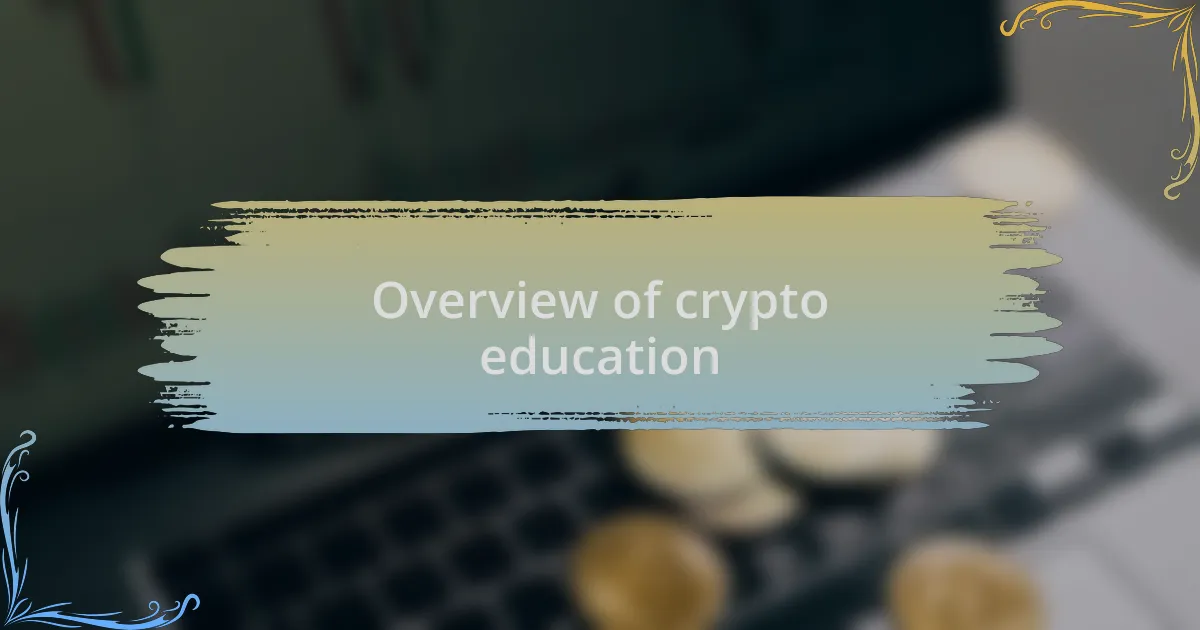
Overview of crypto education
Crypto education is becoming increasingly vital in our technologically advanced world. I remember my first encounter with cryptocurrency; it was overwhelming yet fascinating. I had to sift through a mountain of information to grasp the basics. How amazing would it be if children learned about crypto fundamentals in a structured way, fostering their curiosity from an early age?
The landscape of finance is evolving, and crypto is now a crucial part of that evolution. I still recall discussing Bitcoin’s history with a group of young learners; their eyes lit up as they grasped the concept of decentralized finance. This kind of engagement is essential. If kids are exposed to the principles of crypto early on, they could develop innovative ideas for the future.
Understanding crypto isn’t just about knowing how to trade; it’s about grasping the underlying technology, like blockchain. I often found myself drawn to the way blockchain works – a transparent, secure system that can transform how we view trust. Wouldn’t it be fantastic if children could learn to think critically about such innovations, preparing them to be the innovators of tomorrow?
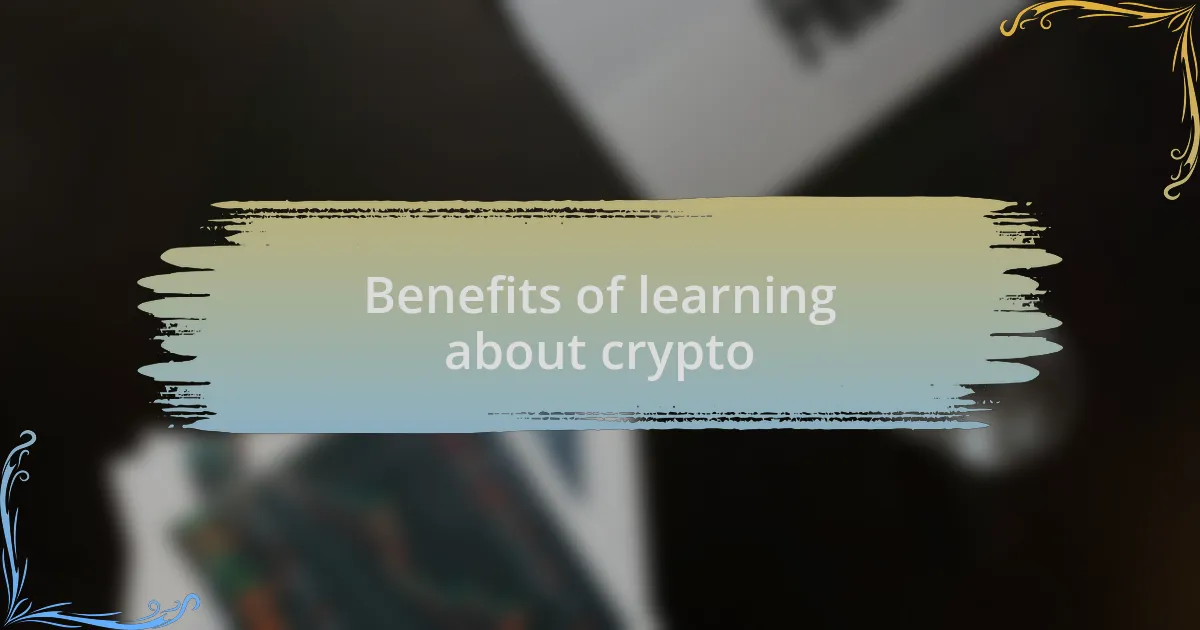
Benefits of learning about crypto
Learning about crypto opens doors to an entirely new realm of financial possibilities. I vividly remember my first attempt at explaining cryptocurrency to a teenager; their face lit up with intrigue as they unpacked the idea of digital assets. It made me realize that when kids grasp these concepts, they don’t just learn—they begin to envision their futures, filled with entrepreneurial ventures and innovations. Isn’t it inspiring to think about what the next generation could achieve if they grasp the potential of these financial tools?
Delving into the world of cryptocurrencies also cultivates financial literacy among young learners. I once had a conversation with a group of kids who created their own crypto tokens for a class project, and the excitement in the room was palpable. They began to understand not only how supply and demand shape value but also how important it is to manage finances wisely. Why should we wait until adulthood to learn these crucial lessons when equipping young minds with such knowledge can lead to more informed, responsible financial decisions later in life?
Moreover, engaging with crypto education encourages critical thinking about technology and its implications. I recall a discussion where a child challenged the conventional banking system after learning about blockchain’s potential to disrupt it. It was a moment that underscored the importance of teaching kids to question the status quo and think about the world differently. Don’t you think fostering that sense of inquiry is essential in a rapidly changing digital landscape?
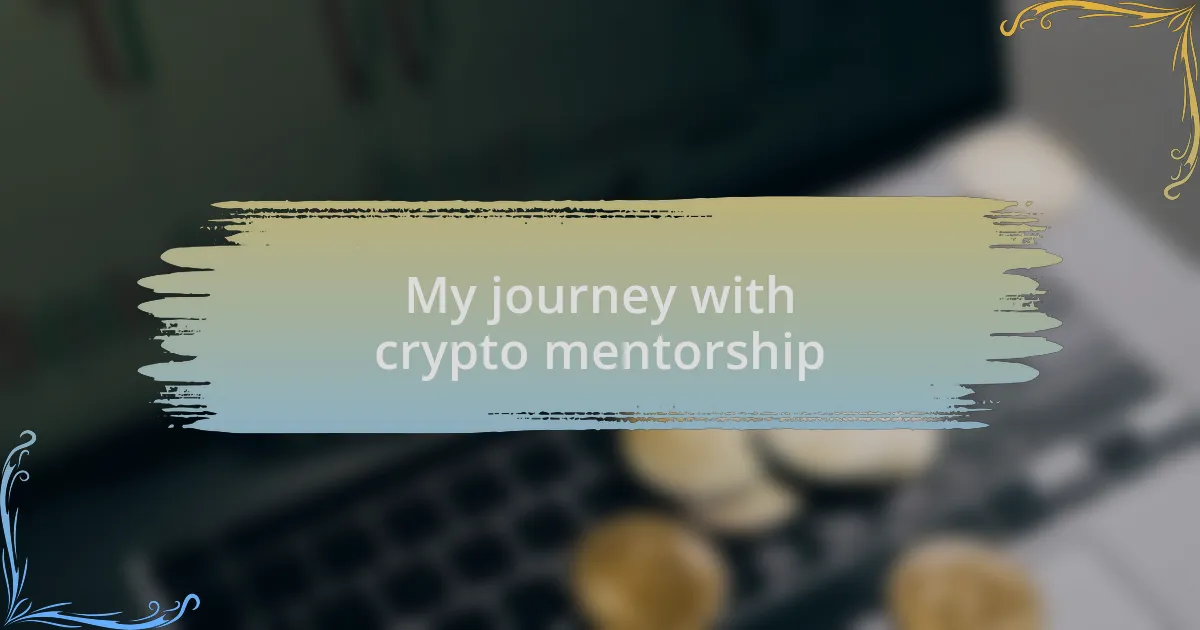
My journey with crypto mentorship
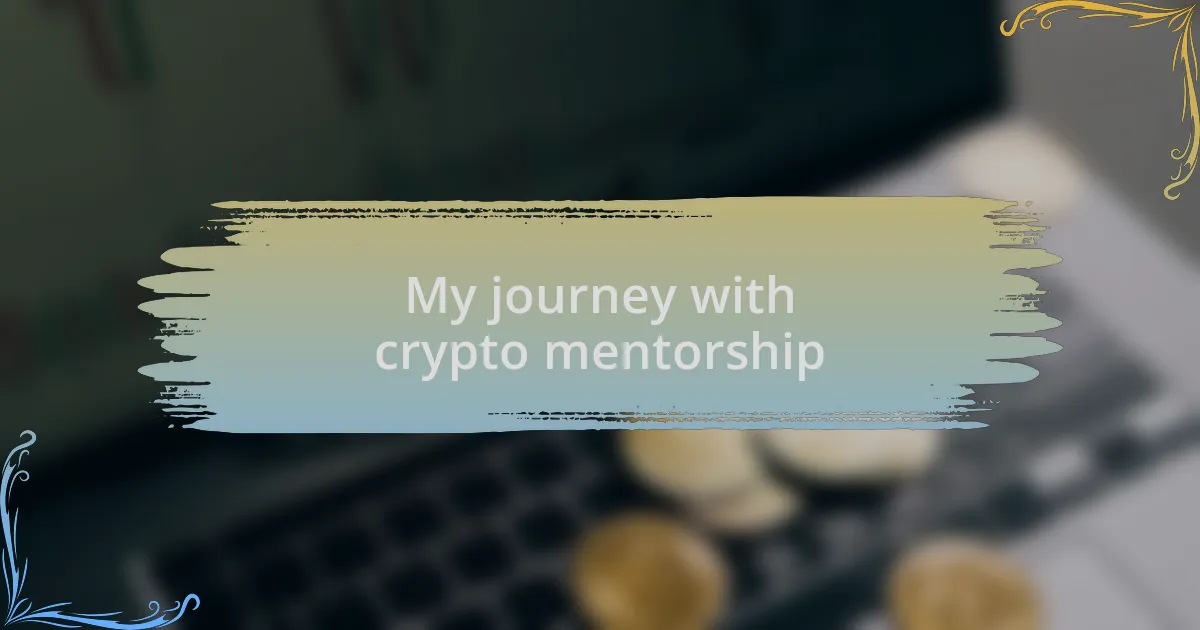
My journey with crypto mentorship
My foray into crypto mentorship was transforming. Early on, I found a mentor who not only explained complex concepts but also provided real-world examples. I remember sitting across from him, sharing my confusion about blockchain, and feeling that spark of clarity as he connected it to everyday transactions I completely understood.
Later, I took part in a group mentorship, where young minds gathered around the table. One evening, as we discussed market trends, I noticed how a simple idea about buying low and selling high resonated with the kids. Seeing their eyes widen with understanding was exhilarating; it was like watching light bulbs flicker on, illuminating a path to financial independence. Isn’t it incredible how shared learning can foster such enthusiasm for investment opportunities?
Reflecting on those experiences, it became clear that mentorship is about more than knowledge transfer; it’s about building confidence. I can still recall the exhilaration I felt when my mentor advised me to start my own crypto portfolio. Taking that leap felt daunting but equally rewarding, reinforcing my belief that with the right guidance, anyone can navigate this intricate financial landscape. Don’t you think that the more we engage in mentorship, the more we set ourselves up for success?
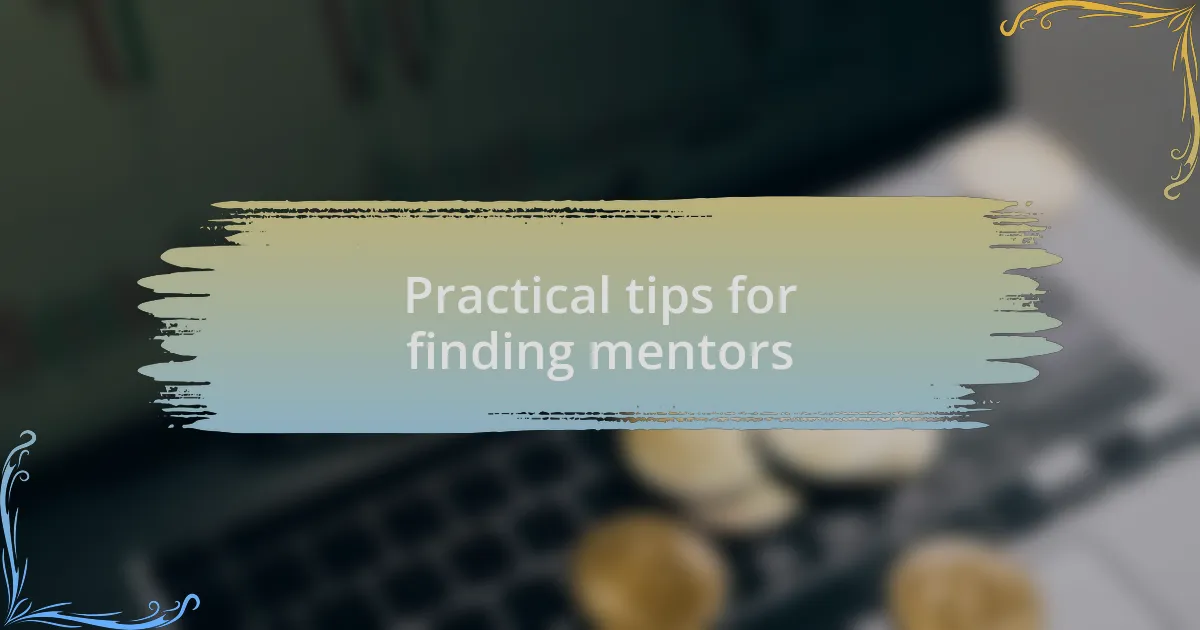
Practical tips for finding mentors
Finding the right mentor can seem daunting, but starting with your immediate circle is a great option. I often recommend reaching out to teachers, family friends, or even local entrepreneurs who have experience in finance or crypto. I remember when I was unsure about connecting with a potential mentor; it turned out that simply expressing my interest in crypto led them to share invaluable insights that shaped my understanding.
Networking events, workshops, or online forums dedicated to crypto can be fantastic avenues for finding mentors. At one event, I met someone who not only shared their journey but also sparked ideas I hadn’t considered before. When you’re in an environment full of like-minded individuals, it’s easier to strike up conversations that might lead to a mentorship. Have you ever thought about how a casual chat could open doors you didn’t even know existed?
Don’t hesitate to take the initiative by asking someone directly to be your mentor. I learned the hard way that hesitation often leads to missed opportunities. When I finally asked my mentor for guidance, I realized that most experienced individuals are more than willing to impart their wisdom. After all, they were once in your position, and many view mentorship as a way to give back to the community. Why not take that leap today?